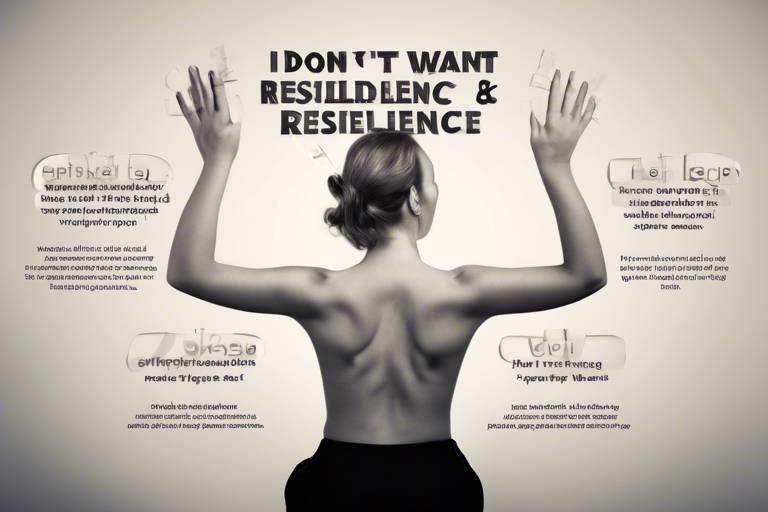How to Develop Self-efficacy and Resilience?
In today's fast-paced world, the ability to bounce back from setbacks and believe in oneself is more crucial than ever. Developing self-efficacy and resilience can significantly impact your personal and professional growth. Imagine standing at the edge of a cliff, looking down at the turbulent waters below. You can either take a leap of faith, trusting your ability to swim, or you can step back, letting fear dictate your actions. Self-efficacy is that leap of faith, while resilience is your ability to navigate the waters once you jump. This article will guide you through understanding these concepts and provide practical strategies to enhance them.
Self-efficacy is defined as the belief in one's own abilities to achieve goals and overcome challenges. It's like having a personal cheerleader in your mind, constantly encouraging you to push through obstacles. This belief is not just a feel-good mantra; it plays a pivotal role in determining how we approach tasks, how much effort we put into them, and how we respond to failures. For instance, if you believe you can successfully complete a project at work, you’re more likely to invest time and energy into it. Conversely, if you doubt your capabilities, you might avoid challenges altogether, stunting your growth. Therefore, understanding and enhancing your self-efficacy is essential for unlocking your full potential.
Resilience is the capacity to recover quickly from difficulties. Think of it as a rubber band; when you stretch it, it may become deformed, but it can return to its original shape. Resilience is crucial for navigating life’s inevitable ups and downs. It allows you to adapt to change, manage stress, and maintain a positive outlook even in challenging circumstances. Cultivating resilience involves recognizing that setbacks are not failures but opportunities to learn and grow. By embracing this mindset, you can face life's challenges with greater confidence and strength.
One of the most effective ways to enhance both self-efficacy and resilience is by developing a growth mindset. This concept, popularized by psychologist Carol Dweck, revolves around the belief that abilities and intelligence can be developed through dedication and hard work. When you adopt a growth mindset, you start to view challenges as opportunities for growth rather than insurmountable obstacles. This shift in perspective fosters resilience, as you become more adaptable and persistent in the face of difficulties. For example, instead of thinking, "I can't do this," you might say, "I can't do this yet, but I can learn." This simple change in language can ignite a powerful transformation in your approach to challenges.
Limiting beliefs are those nagging thoughts that tell you what you can't do. They can be as subtle as, "I'm not good enough" or as overt as, "I'll never succeed." These beliefs can severely hinder your self-efficacy and resilience. To combat them, you must first identify these negative thoughts. Once you recognize them, challenge their validity. Ask yourself questions like, "What evidence do I have that supports this belief?" or "What would I tell a friend who thought this way?" By reframing these beliefs, you empower yourself to break free from their constraints.
Setting realistic and achievable goals is crucial for building self-efficacy. Think of your goals as stepping stones on a path to success. If you set your sights too high, you risk becoming overwhelmed and discouraged. Instead, break your goals down into smaller, manageable tasks. For instance, if your goal is to run a marathon, start by aiming to run a mile without stopping. Celebrate each small victory along the way, as these accomplishments will boost your confidence and reinforce your belief in your abilities. Remember, every expert was once a beginner!
Self-compassion is about treating yourself with kindness, especially during tough times. It’s easy to be your own worst critic, but this mindset can erode your resilience. Instead, practice speaking to yourself as you would to a close friend. When you encounter setbacks, remind yourself that it’s okay to fail and that everyone experiences challenges. This gentle approach fosters emotional strength and recovery, allowing you to bounce back more effectively.
Improving self-efficacy involves a combination of strategies that build confidence and competence. Here are a few practical techniques:
- Skill Development: Continuously seek opportunities to learn and improve your skills.
- Seek Feedback: Constructive criticism can provide insights into your strengths and areas for improvement.
- Visualize Success: Picture yourself achieving your goals; this mental rehearsal can enhance your belief in your abilities.
Building a supportive network is vital for enhancing self-efficacy. Surround yourself with friends, family, and mentors who uplift and encourage you. Their belief in your abilities can significantly boost your confidence, making it easier to tackle challenges. Remember, even the strongest individuals need support sometimes!
Facing challenges head-on is essential for developing resilience. Stepping out of your comfort zone may feel uncomfortable, but it’s often where the most significant growth occurs. Each challenge you overcome reinforces your belief in your abilities and strengthens your resilience. So, the next time you find yourself hesitating, ask yourself: "What’s the worst that could happen?" Often, the answer is far less daunting than you think!
Q: What is self-efficacy?
A: Self-efficacy is the belief in one's ability to succeed in specific situations or accomplish tasks.
Q: How can I improve my resilience?
A: You can improve resilience by developing a growth mindset, practicing self-compassion, and building a supportive network.
Q: Why is self-efficacy important?
A: Self-efficacy influences motivation, performance, and the ability to overcome challenges, making it crucial for personal and professional success.

Understanding Self-efficacy
Self-efficacy is more than just a buzzword; it’s a powerful concept that shapes our actions and influences our success. At its core, self-efficacy refers to the belief in one's ability to accomplish specific tasks and achieve goals. Imagine standing at the foot of a mountain, looking up at the peak. If you believe you can climb it, you’re more likely to take that first step. Conversely, if you doubt your abilities, that mountain might as well be a wall. This belief system is crucial because it directly affects our motivation, behavior, and emotional responses.
Research shows that individuals with high self-efficacy are more likely to embrace challenges, persist through difficulties, and ultimately achieve their goals. This belief acts as a driving force that propels us forward, especially when the going gets tough. On the other hand, those with low self-efficacy might shy away from challenges, feeling overwhelmed before they even begin. It’s like trying to swim in deep water without knowing how to float; fear can paralyze us.
But why is self-efficacy so important? It plays a vital role in various aspects of our lives, including:
- Academic Achievement: Students with high self-efficacy tend to set higher goals and are more resilient in the face of academic challenges.
- Career Success: In the workplace, employees who believe in their capabilities are more likely to take initiative, seek out new opportunities, and advance in their careers.
- Personal Relationships: Self-efficacy influences how we communicate and interact with others, impacting our relationships positively.
In essence, self-efficacy is the backbone of personal and professional growth. It’s what fuels our ambition and helps us navigate the ups and downs of life. By understanding and enhancing our self-efficacy, we can unlock our potential and achieve our dreams. So, how do we cultivate this vital trait? That’s where the journey begins, and it’s filled with exciting strategies and insights that can transform our lives.

The Role of Resilience
Resilience, at its core, is the ability to bounce back from adversity, setbacks, and challenges. Imagine a rubber band; no matter how much you stretch it, it always returns to its original shape. This metaphor beautifully captures the essence of resilience. It’s not just about enduring tough times; it’s about emerging from them even stronger and more capable. In today’s fast-paced world, where change is constant and obstacles seem to lurk around every corner, cultivating resilience has become more crucial than ever.
So, why is resilience so important? Well, it plays a significant role in our personal and professional lives. When we encounter challenges—be it a job loss, a difficult relationship, or a health scare—our ability to recover and adapt can determine our overall well-being and success. Resilience helps us to:
- Maintain a Positive Outlook: Resilient individuals tend to view challenges as opportunities for growth rather than insurmountable obstacles.
- Improve Problem-Solving Skills: They develop better strategies for tackling problems, leading to more effective solutions.
- Enhance Emotional Regulation: Resilience fosters the ability to manage emotions, reducing the likelihood of feeling overwhelmed.
- Strengthen Relationships: Resilient people often have stronger social networks, as they can communicate and connect more effectively during tough times.
Research indicates that resilient individuals often experience lower levels of stress and anxiety. They are more likely to engage in healthy coping mechanisms, such as seeking support from friends and family or practicing mindfulness. This is a stark contrast to those who lack resilience, who may resort to unhealthy behaviors like substance abuse or withdrawal from social interactions.
Building resilience is not a one-time event; it’s a lifelong journey. It involves developing certain characteristics and behaviors that can be cultivated over time. Some key traits of resilient individuals include:
| Trait | Description |
|---|---|
| Optimism | The ability to maintain a hopeful outlook even in the face of difficulties. |
| Adaptability | The capacity to adjust to new situations and challenges with ease. |
| Self-awareness | Understanding one’s own emotions, strengths, and weaknesses. |
| Empathy | The ability to understand and share the feelings of others, fostering strong connections. |
By recognizing and nurturing these traits, anyone can enhance their resilience. It’s about shifting your perspective and developing a toolkit of strategies that can help you navigate life’s ups and downs. For instance, practicing mindfulness can help you stay grounded during turbulent times, while setting realistic goals can provide a sense of direction and purpose.
In conclusion, resilience is not merely a trait you either have or don’t have; it’s a skill that can be developed and strengthened over time. By embracing challenges, maintaining a positive outlook, and building supportive relationships, you can cultivate resilience that will serve you well throughout your life. So, the next time you face a setback, remember: it’s not the fall that defines you, but how you rise after it.
Q: Can anyone become more resilient?
A: Absolutely! Resilience is a skill that can be developed through practice and intention.
Q: What are some quick ways to build resilience?
A: Start by practicing mindfulness, setting achievable goals, and reaching out to your support network.
Q: How does resilience impact mental health?
A: Resilience can significantly reduce stress and anxiety, leading to improved mental health and overall well-being.

Building a Growth Mindset
Building a growth mindset is akin to planting a seed in fertile soil; with the right care and attention, it can blossom into something extraordinary. A growth mindset is the belief that our abilities and intelligence can be developed through dedication, effort, and learning. This concept, popularized by psychologist Carol Dweck, emphasizes that challenges are opportunities for growth rather than insurmountable obstacles. By embracing this mindset, we can unlock our potential and enhance our resilience and self-efficacy.
So, how do we cultivate this transformative mindset? First, it’s essential to recognize that failure is not a reflection of our worth but a stepping stone to success. Just think about it: every great inventor or artist faced countless setbacks before achieving their breakthroughs. Instead of shying away from difficulties, we should welcome them as valuable lessons. When we view challenges this way, we not only become more resilient but also more likely to take risks and pursue new opportunities.
Another key aspect of building a growth mindset is the power of self-talk. The way we talk to ourselves can significantly influence our motivation and performance. Instead of saying, “I can’t do this,” try reframing it to, “I can’t do this yet.” This small shift in language can open up a world of possibilities and foster a sense of capability. It's like changing the lens through which we view our abilities—suddenly, we are not limited by our current skills but are on a journey of continuous improvement.
Moreover, surrounding ourselves with a supportive community can greatly enhance our growth mindset. Engaging with others who share similar aspirations can provide encouragement, constructive feedback, and inspiration. Just as a garden thrives with sunlight and water, our mindset flourishes in a nurturing environment. When we connect with those who challenge us and celebrate our progress, we reinforce our belief in our ability to grow and adapt.
In addition to these strategies, it’s vital to set realistic goals that stretch our capabilities. Goals act as a roadmap, guiding us through the process of growth. When we set achievable yet challenging objectives, we create opportunities for success and learning. Tracking our progress and celebrating small wins along the way can further boost our confidence and reinforce our belief in our abilities. After all, every small step forward is a victory worth acknowledging!
To summarize, building a growth mindset involves:
- Embracing challenges as opportunities for growth.
- Practicing positive self-talk and reframing negative thoughts.
- Surrounding ourselves with a supportive community.
- Setting realistic goals and celebrating progress.
By incorporating these practices into our daily lives, we can foster a mindset that not only enhances our resilience and self-efficacy but also enriches our personal and professional journeys. Remember, the journey of growth is ongoing, and every effort counts!
Q1: What is a growth mindset?
A growth mindset is the belief that our abilities and intelligence can be developed through dedication and hard work. It encourages embracing challenges and viewing failures as opportunities for growth.
Q2: How can I develop a growth mindset?
You can develop a growth mindset by practicing positive self-talk, embracing challenges, setting realistic goals, and surrounding yourself with supportive individuals who encourage your growth.
Q3: Why is a growth mindset important?
A growth mindset is important because it enhances resilience, boosts self-efficacy, and fosters a love for learning. It helps individuals navigate challenges more effectively and achieve their personal and professional goals.

Overcoming Limiting Beliefs
Limiting beliefs can act like invisible chains, holding you back from reaching your full potential. They are those nagging thoughts that whisper, "You can't do this," or "You're not good enough." These beliefs often stem from past experiences, societal expectations, or even well-meaning advice from others. But here’s the kicker: just because you believe something doesn’t make it true! The first step in overcoming these beliefs is to recognize them. Awareness is the key to breaking free from their grip.
Think about a time when you hesitated to pursue a goal because of a limiting belief. Perhaps you thought, "I’ll never be able to learn that skill," or "I’m too old to start a new career." These thoughts can be incredibly powerful, shaping your actions and decisions. The good news is that with a little effort, you can challenge and change these beliefs. Start by asking yourself a few critical questions:
- What evidence do I have that supports this belief?
- Are there examples of others who have succeeded despite similar challenges?
- What would I tell a friend who expressed this belief?
By questioning the validity of your limiting beliefs, you can begin to dismantle them piece by piece. It might feel uncomfortable at first, but think of it like peeling an onion; each layer removed brings you closer to the core of your true potential. Additionally, replacing negative thoughts with positive affirmations can help rewire your mindset. For instance, instead of saying, "I can’t do this," try saying, "I am capable of learning and growing." This simple shift in language can create a ripple effect in your self-efficacy.
Another effective strategy is to visualize success. Imagine yourself overcoming the limitations you’ve set for yourself. Picture the steps you would take, the skills you would acquire, and the joy of achieving your goals. Visualization is a powerful tool that can enhance motivation and resilience, making the impossible seem possible. To further support your journey, consider keeping a journal where you document your progress, challenges, and victories. This can serve as a tangible reminder of how far you've come.
Lastly, surround yourself with positive influences. Engage with people who uplift and inspire you. Their encouragement can bolster your confidence and help you see beyond your limiting beliefs. Remember, overcoming limiting beliefs is not a one-time event; it’s an ongoing process. Embrace the journey and celebrate your growth along the way!

Setting Achievable Goals
Setting achievable goals is like laying down the stepping stones on your path to success. It’s not just about dreaming big; it’s about crafting a roadmap that leads you toward those dreams in a realistic and measurable way. When you set goals that are attainable, you create a sense of direction and purpose, which fuels your motivation and enhances your self-efficacy. Think of it as planting seeds in a garden; if you choose the right seeds and nurture them properly, you’ll eventually reap a bountiful harvest.
So, how do you go about setting these achievable goals? First, it’s crucial to ensure that your goals are SMART: Specific, Measurable, Achievable, Relevant, and Time-bound. This framework not only clarifies what you want to accomplish but also enables you to track your progress. For instance, rather than saying, “I want to get fit,” a SMART goal would be, “I will exercise for 30 minutes at least three times a week for the next two months.” This specificity helps you visualize your target and keeps you accountable.
Moreover, breaking larger goals into smaller, manageable tasks can significantly boost your confidence. Imagine you want to write a book. Instead of feeling overwhelmed by the enormity of the task, you can divide it into smaller milestones like:
- Researching your topic
- Creating an outline
- Writing a chapter a week
- Editing and revising
By focusing on these smaller tasks, you can celebrate small victories along the way, which reinforces your belief in your abilities and encourages you to keep going.
Another effective strategy is to regularly review and adjust your goals. Life is unpredictable, and sometimes we need to adapt our plans to stay aligned with our evolving aspirations. This flexibility not only keeps your goals relevant but also allows you to embrace new opportunities that may arise. For example, if you initially set a goal to learn a new language but find a passion for graphic design instead, don’t hesitate to shift your focus. This adaptability is a key characteristic of resilient individuals.
Lastly, don’t forget to visualize your success. Picture yourself achieving your goals and the positive feelings that come with it. Visualization can be a powerful tool in boosting your self-efficacy. When you can see yourself succeeding, you’re more likely to take the necessary steps to make that vision a reality. It’s like being the director of your own movie, where you get to cast yourself in the leading role of your life!
In conclusion, setting achievable goals is not just about the end result; it’s about the journey, the learning, and the growth that occurs along the way. By implementing these strategies, you’ll not only enhance your self-efficacy but also cultivate resilience, allowing you to navigate life’s challenges with confidence and grace.
1. What are SMART goals?
SMART goals are Specific, Measurable, Achievable, Relevant, and Time-bound objectives that help you define and track your progress effectively.
2. How can I stay motivated while pursuing my goals?
Staying motivated can be achieved by breaking your goals into smaller tasks, celebrating small victories, and regularly reviewing your progress to adjust your goals as needed.
3. What should I do if I fail to achieve a goal?
Failure is a part of the journey. Reflect on what went wrong, learn from the experience, and adjust your approach. Remember, resilience is about bouncing back and trying again!
4. How does visualization help in goal setting?
Visualization helps by allowing you to imagine your success, which can boost your confidence and motivation to take the necessary steps to achieve your goals.

Practicing Self-Compassion
In today's fast-paced world, practicing self-compassion is more important than ever. It's about treating yourself with the same kindness and understanding that you would offer to a dear friend. Imagine you’re having a tough day, and instead of beating yourself up over mistakes, you pause and say, "It's okay; everyone struggles sometimes." This simple shift in perspective can be transformative. Self-compassion allows you to acknowledge your imperfections without judgment, fostering emotional strength and resilience.
Many people confuse self-compassion with self-indulgence, thinking that being kind to oneself means letting go of accountability. However, that couldn't be further from the truth. Practicing self-compassion helps you face your shortcomings with grace, leading to personal growth rather than stagnation. It encourages you to learn from your experiences instead of wallowing in self-pity. By embracing your flaws, you create a safe space for improvement.
So, how can you cultivate self-compassion in your daily life? Here are a few practical strategies:
- Mindfulness: Be aware of your thoughts and feelings without judgment. Acknowledge when you're feeling down, and allow yourself to feel those emotions.
- Self-Kindness: Treat yourself as you would treat a close friend. Offer yourself words of encouragement instead of criticism.
- Common Humanity: Recognize that suffering and personal inadequacy are part of the shared human experience. You are not alone in your struggles.
Research shows that self-compassion can lead to greater emotional resilience. When faced with challenges, those who practice self-compassion are more likely to bounce back and learn from their experiences. Think of self-compassion as your emotional safety net. When you fall, it cushions your landing, allowing you to get back up and try again.
Additionally, consider keeping a self-compassion journal. In this journal, you can write about your experiences and reflect on how you treated yourself during tough times. Over time, this practice can help you identify patterns in your self-talk and encourage a more compassionate inner dialogue.
In summary, practicing self-compassion is not just about being nice to yourself; it's a powerful tool for building resilience and self-efficacy. By fostering a kind and understanding relationship with yourself, you can navigate life's challenges with greater ease and emerge stronger on the other side.
- What is self-compassion? Self-compassion involves treating yourself with kindness and understanding during difficult times, rather than being harsh or critical.
- How can self-compassion improve resilience? By fostering a supportive inner dialogue, self-compassion helps individuals recover from setbacks more effectively, promoting emotional strength.
- Can self-compassion lead to complacency? No, self-compassion encourages personal growth by allowing individuals to learn from their mistakes without judgment.
- What are some exercises to practice self-compassion? Mindfulness meditation, self-compassion journaling, and positive affirmations are effective exercises to cultivate a kinder self-view.

Strategies for Enhancing Self-efficacy
Enhancing self-efficacy is a journey that requires conscious effort and a toolbox of effective strategies. Think of self-efficacy as the fuel that powers your engine of success; without it, even the best-designed vehicle might struggle to move forward. So, how do we fill up that tank? One of the most effective ways is through skill development. Engaging in activities that challenge your abilities can significantly boost your confidence. When you invest time in learning and mastering new skills, you create a solid foundation for believing in your capabilities. Whether it’s picking up a new hobby, enrolling in a course, or simply practicing a skill you want to improve, the key is to keep pushing your boundaries.
Another powerful strategy is seeking feedback. Feedback acts like a mirror, reflecting your strengths and areas for improvement. It’s essential to surround yourself with people who can provide constructive criticism and encouragement. When you receive feedback, it helps you understand your progress and areas where you can grow. It’s like having a coach by your side, guiding you through the twists and turns of your journey. So, don’t shy away from asking for feedback; embrace it as a valuable tool for growth.
Visualization is another potent method for enhancing self-efficacy. Imagine yourself succeeding in your endeavors—whether it’s acing a presentation, completing a challenging project, or overcoming a personal hurdle. This mental rehearsal can create a sense of familiarity and confidence. When you visualize success, your brain starts to believe that it’s possible, making it easier to achieve those goals in real life. It’s like practicing for a big game; the more you visualize the winning play, the more likely you’ll execute it flawlessly.
Moreover, setting achievable goals is crucial. When you set realistic and manageable goals, you create a roadmap that guides you toward success. Break down larger goals into smaller, actionable steps. Celebrate your achievements along the way, no matter how small they may seem. Each small victory builds your self-efficacy, reinforcing the belief that you can tackle even bigger challenges. Here’s a simple table to illustrate the process of setting effective goals:
| Goal Type | Example | Action Steps |
|---|---|---|
| Short-term | Complete a book | Read 10 pages daily |
| Medium-term | Learn a new skill | Take an online course |
| Long-term | Start a business | Create a business plan, secure funding |
Lastly, don’t underestimate the power of support from others. Building a network of friends, family, and mentors who believe in you can significantly enhance your self-efficacy. When you have people cheering you on, it’s easier to take risks and pursue your goals. Think of it as having a safety net; even if you stumble, you know there are people ready to catch you and help you get back on your feet. So, reach out, connect, and foster those relationships that uplift and empower you.
- What is self-efficacy? Self-efficacy is the belief in your ability to succeed in specific situations or accomplish a task.
- How can I improve my self-efficacy? You can improve your self-efficacy by developing skills, seeking feedback, visualizing success, setting achievable goals, and building a supportive network.
- Why is self-efficacy important? Self-efficacy is crucial because it influences your motivation, resilience, and overall performance in various aspects of life.

Seeking Support from Others
When it comes to enhancing self-efficacy and building resilience, there's a powerful tool that many people overlook: the support of others. Think of it like having a sturdy safety net beneath you when you’re walking a tightrope. Life can throw some pretty hefty challenges your way, and having a reliable support system can make all the difference, helping you bounce back from setbacks and boosting your belief in your own abilities.
Support from friends, family, and mentors can provide not just emotional comfort but also practical advice and encouragement. Imagine you’re trying to climb a mountain; wouldn’t it be easier if you had a team cheering you on from below? They can help you see your strengths when you might feel overwhelmed by your weaknesses. This external perspective can be invaluable, especially during tough times when self-doubt creeps in.
Here are some ways that seeking support can enhance your self-efficacy:
- Emotional Encouragement: Sometimes, all we need is a little pep talk. Friends and family can uplift our spirits and remind us of our capabilities.
- Practical Advice: A mentor or someone who has faced similar challenges can offer insights that you might not have considered.
- Accountability: Sharing your goals with others can create a sense of responsibility, motivating you to take action.
Building a supportive network doesn’t happen overnight; it takes time and effort. Start by reaching out to those you trust and share your goals and challenges with them. You might be surprised by how willing they are to help. Additionally, consider joining groups or communities that align with your interests or professional goals. These environments can foster connections with like-minded individuals who understand your journey.
Moreover, remember that support is a two-way street. While you seek encouragement, be sure to offer your support to others as well. This reciprocal relationship can strengthen bonds and create a nurturing environment where everyone feels valued and empowered. The more you invest in your relationships, the more robust your support network will become.
In conclusion, seeking support from others is not a sign of weakness; it’s a strategic move towards enhancing your self-efficacy and resilience. So, don’t hesitate to lean on your network when the going gets tough. After all, we’re all in this together, and sometimes, a little help can lead to monumental growth.
1. How can I find a mentor?
Look for someone in your field or area of interest who inspires you. Reach out via social media, professional networks, or local events. Don’t be shy; most people are happy to share their knowledge!
2. What if my friends or family are not supportive?
It’s tough when your immediate circle doesn’t provide the support you need. Consider expanding your network through community groups, online forums, or workshops where you can meet new people who share your interests and goals.
3. How do I know if I’m being supportive to others?
Being supportive means listening actively, offering help when needed, and encouraging others in their endeavors. Check in with your friends and family to see how they feel about your support!

Embracing Challenges
Embracing challenges is akin to stepping into a thrilling roller coaster ride—there's a mix of fear, excitement, and the promise of growth. When we face challenges head-on, we not only test our limits but also discover new strengths we never knew we had. Think about it: every time you push through a difficult situation, you're essentially breaking down barriers that once held you back. This process is crucial for developing resilience and self-efficacy, as it allows us to learn from our experiences and adapt to future obstacles.
Why is it so important to embrace challenges, you might wonder? Well, challenges are the catalysts for change. They force us out of our comfort zones and compel us to confront our fears. When you tackle a challenge, you’re not just solving a problem; you're also building confidence in your abilities. This newfound confidence can create a powerful ripple effect in other areas of your life. For instance, someone who successfully navigates a tough work project may feel emboldened to take on leadership roles or pursue new opportunities.
It's essential to adopt a mindset that views challenges as opportunities rather than threats. This shift in perspective can be transformative. Here are a few ways to cultivate this mindset:
- Reframe your thoughts: Instead of thinking, "I can't do this," try saying, "This is a chance for me to learn and grow."
- Focus on the process: Concentrate on the steps you need to take rather than the outcome. This helps to reduce anxiety and makes challenges feel more manageable.
- Celebrate small victories: Each step you take towards overcoming a challenge is a win. Acknowledging these small successes can boost your motivation and resilience.
Moreover, embracing challenges also cultivates a sense of community. When we share our struggles and triumphs with others, we create connections that can provide support and encouragement. Whether it's through friends, family, or professional networks, having a support system can make all the difference when tackling life's hurdles. Remember, you're not alone in your journey; many others are facing their own challenges, and sharing experiences can foster a sense of camaraderie.
Finally, it's crucial to remember that failure is not the end of the world. In fact, failure is often the best teacher. Each setback provides valuable lessons that can inform your future decisions and actions. The key is to view failure as a stepping stone rather than a stumbling block. By embracing challenges and learning from failures, you build a robust foundation of resilience and self-efficacy that will serve you well in all aspects of your life.
- What is the best way to start embracing challenges? Start small by taking on manageable challenges in your daily life, gradually increasing their complexity as your confidence grows.
- How can I maintain motivation when facing tough challenges? Focus on your reasons for taking on the challenge, visualize your success, and seek support from others to keep your motivation high.
- Is it normal to feel afraid when facing challenges? Absolutely! Feeling fear is a natural response, but it's important to acknowledge it and push through despite those feelings.
Frequently Asked Questions
- What is self-efficacy?
Self-efficacy is the belief in one’s own abilities to succeed in specific situations or accomplish a task. It plays a crucial role in how we approach goals, tasks, and challenges. When you believe you can achieve something, you're more likely to put in the effort and persist through difficulties.
- How does resilience differ from self-efficacy?
While self-efficacy focuses on your belief in your capabilities, resilience is about how well you can bounce back from setbacks. Resilience helps you recover from failures and challenges, while self-efficacy empowers you to face those challenges in the first place. Together, they form a powerful combination for personal growth.
- Can I improve my self-efficacy?
Absolutely! You can enhance your self-efficacy by setting small, achievable goals, seeking feedback, and celebrating your successes. Surrounding yourself with supportive people and visualizing your success can also significantly boost your confidence in your abilities.
- What are some common limiting beliefs?
Common limiting beliefs include thoughts like "I'm not good enough," "I always fail," or "I can't change." Recognizing these beliefs is the first step toward overcoming them. Challenge these thoughts by reframing them into positive affirmations and focusing on your strengths.
- How does practicing self-compassion help with resilience?
Practicing self-compassion means treating yourself with kindness during tough times. It allows you to acknowledge your feelings without harsh self-judgment. This approach fosters emotional strength, helping you recover more effectively from setbacks and view challenges as opportunities for growth.
- What role does a growth mindset play in developing resilience?
A growth mindset encourages you to see challenges as opportunities to learn rather than obstacles. By embracing this mindset, you become more adaptable and persistent, which are key traits for building resilience. It shifts your focus from fear of failure to the excitement of learning and growth.
- How can I set achievable goals?
To set achievable goals, start by making them specific, measurable, attainable, relevant, and time-bound (SMART). Break larger goals into smaller, manageable tasks, and celebrate each milestone you reach. This approach not only boosts your confidence but also keeps you motivated along the way.
- Why is seeking support important for self-efficacy?
Having a strong support network can significantly enhance your self-efficacy. Friends, family, and mentors can provide encouragement, constructive feedback, and different perspectives. Knowing that you have people who believe in you can bolster your confidence and motivate you to take on challenges.
- How can I embrace challenges effectively?
Embracing challenges involves stepping out of your comfort zone and viewing difficulties as opportunities for growth. Start by taking small risks, and gradually increase the level of challenge. Reflect on what you learn from each experience, and remember that every challenge faced is a step toward building resilience.



















